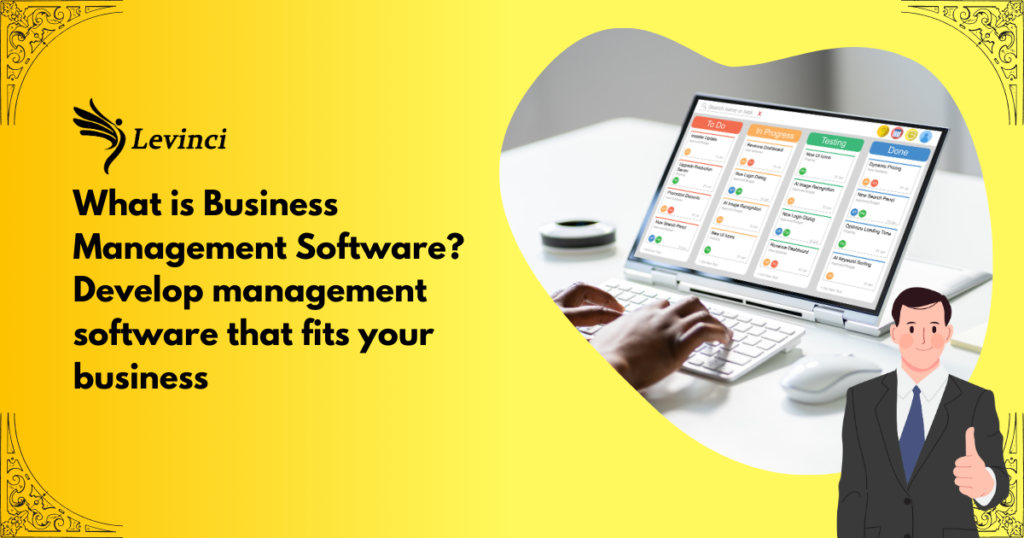From small startups to multinational corporations, businesses are increasingly turning to BMS to centralize their operations, enhance collaboration, and drive sustainable growth. So, what exactly is Business Management Software, and what should businesses consider when choosing business management software? Let’s find out with Levinci!
What is Business Management Software?

Business management software (BMS) is essentially a digital toolbox that streamlines and integrates various aspects of running a business. It is a central hub that connects different functions like accounting, customer relationship management, inventory control, project management, and human resources.
How can Business Management Software help organizations?
Centralized data management

One of the most significant advantages of business management software (BMS) is its ability to centralize data management. This means all your crucial business information, from customer details and inventory levels to financial records and project progress, resides in one secure and accessible location.
You can pull data from various departments to identify trends, track performance metrics, and gain valuable insights into your business operations. Therefore, you can make informed choices based on real-time information, not guesswork.
Improve communication and collaboration between departments
Business management software (BMS) isn’t just about data; it’s also a powerful tool for fostering better communication and collaboration within your company. Everyone in the business has direct access to a common platform and a single source of data.
In particular, business management software also integrates other useful features such as instant messaging, video conferencing, and task management tools. This creates a central hub for team discussions, file sharing, project updates, and management. This has facilitated enhanced communication and coordination across the company’s various projects and strategies.
Cost savings
Business management software goes beyond just managing data. It offers a comprehensive solution that can significantly reduce operational costs, improve efficiency, and empower businesses to make smarter financial decisions. The cost savings achieved through automation, streamlined workflows, and data-driven insights can outweigh the initial investment, making BMS a worthwhile investment for businesses of all sizes.
For example, business management software eliminates the need for paper-based systems like invoices, receipts, and contracts. Everything is stored and managed electronically, saving on printing, storage, and paper costs.
Increased data accuracy
Business management software helps automate features, processes, and all necessary activities for businesses. This helps significantly reduce data errors or risks during operations. This feature not only helps businesses avoid costly mistakes but also provides businesses with more trusted datasets. From there, businesses can easily review performance, evaluate projects as well as build strategies.
For example, previously an accounting department traditionally relied on manual data entry for invoices which was prone to errors and inconsistencies. By implementing a BMS with data validation rules and automated data capture, the department significantly reduced errors, improved data accuracy, and streamlined the accounting process.
Scalability and customization
Unlike rigid traditional software, BMS can be scaled up or down depending on your business size. Furthermore, many BMS solutions offer customization options to streamline workflows specific to your business processes. You can configure data fields, set up automated triggers, and define user permissions to create a system that perfectly suits your unique needs.
A startup initially uses a BMS with basic accounting and inventory management features. As the business grows and adds a sales team, they can easily scale up the user licenses and add a CRM module to manage customer relationships.
Main types of business management software

Accounting
Accounting software has the ability to connect with individual financial modules to track your business’s financial transactions, including income, expenses, accounts payable, and accounts receivable. It also helps you generate financial reports, manage budgets, and ensure compliance with tax regulations.
Customer Relationship Management (CRM)
Customer relationship management (CRM) systems focus on managing all aspects of a customer’s relationship with your business. This includes lead generation, marketing automation, sales pipeline management, and customer service. CRM helps businesses interact with customers better, streamline services, and enhance customer value.
Human Resources (HR)
Human resources (HR) software helps businesses streamline HR processes such as recruitment, onboarding, training, performance management, and payroll. HR software can also help manage employee benefits and compliance.
Resource management
This software optimizes the allocation and utilization of your company’s resources, which can include people, equipment, materials, and finances. It also helps you ensure you have the right resources available at the right time to complete projects and meet business goals.
Marketing and sales
Marketing and sales software provides tools to automate marketing campaigns, manage leads, track sales performance, social media management, marketing/sales analytics, and generate reports. Marketing and sales software can help you take care of and track potential customers through the sales system, helping businesses close more deals and improve customer conversion rates.
What should businesses consider when choosing business management software?
Needs assessment
Needs assessment is a crucial first step when choosing business management software (BMS). It’s like taking a business inventory to identify the gaps you want the software to fill. You need to consider your company size and identify the areas in your business that need the most improvement, such as CRM capabilities, accounting tools, or project management functionalities.
By understanding your specific needs, you can avoid getting overwhelmed by the vast array of BMS options available. You can focus on software solutions that directly address your challenges and pain points.
Deployment options
Depending on each specific need, businesses can choose cloud-based solutions or on-premises solutions. Businesses with high customization needs or strict data privacy requirements might lean towards on-premise deployment. For those prioritizing affordability, scalability, and ease of use, cloud-based solutions might be a better fit.
Integration capabilities
Integration capabilities are a key factor to consider when choosing business management software (BMS). A well-integrated BMS can streamline workflows, eliminate data silos, empower your team to work smarter and improve communication.
For example, an integration between your BMS and CRM might automatically generate invoices when a sales order is confirmed. This streamlines workflows and frees up your team to focus on more strategic tasks.
Industry-specific solutions
Industry-specific business management software (BMS) solutions can be a game-changer for businesses. While general-purpose BMS options offer a broad range of features, industry-specific solutions cater to the unique needs and workflows of a particular sector.
For example, construction management software would include features for project bidding, material tracking, and workforce scheduling, functionalities not typically found in general accounting software.
Business size
The needs of a small company will differ significantly from those of a large enterprise. Therefore, businesses should consider their scale as well as future growth before deploying business management software.
By carefully evaluating your business size and its specific needs, you can make an informed decision and choose a business management software solution that empowers your team, streamlines operations, and fuels sustainable growth.
Develop business management software to meet your demand with Levinci
Between juggling tasks, managing teams, and keeping track of data, it’s easy to feel like you’re drowning in a sea of spreadsheets and sticky notes. Levinci is here to change that. We offer a comprehensive business management software solution designed to meet your specific demands and streamline your operations, allowing you to focus on what matters most – growing your business.

With Levinci, you have the power to shape your management software according to your specific requirements. Whether you’re a small startup looking to streamline your processes or a growing enterprise seeking to optimize efficiency, Levinci offers the flexibility and customization you need to thrive in any market.
Conclusion
Business Management Software is a powerful tool that empowers you to streamline operations, make data-driven decisions, and achieve your business goals. Deploy suitable business management software that meets all your needs with Levinci today!

